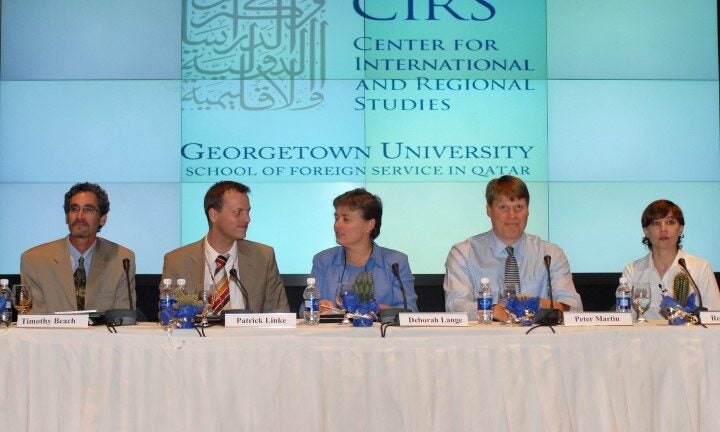Dialogue Series, Environmental Studies, Panels, Regional Studies
Environmental Degradation and Conservation: Challenges and Prospects

Experts from Education City and around the world came together on Monday, 12 November 2007, to discuss the environmental consequences of Qatar’s rapid industrialization. Panelists from each of the branch campuses at Education City took part in the discussion. The event was sponsored by the Center for International and Regional Studies (CIRS) and the Georgetown University School of Foreign Service in Qatar (SFS-Qatar).
Timothy Beach, Director of Georgetown University’s Center for the Environment, described how the earth’s climate tends to follow short cycles of warm weather followed by longer eras of cold weather. According to Beach, these cycles explain the desertion of the Mayan people, as well as settlement of people along the Nile river valley. Beach credited An Inconvenient Truth, Al Gore’s award-winning film on climate change, on raising the public’s awareness of the problem. However, Beach pointed out that Gore’s film uses low-probability/high-impact actions to drive people to action.
Patrick Linke discussed water resource issues in Qatar. As a chemical engineer at Texas A&M University in Qatar, Linke has been studying the use of seawater and desalinated water to fulfill the needs of the rapid industrialization.
Deborah Lange of Carnegie Mellon University in Pittsburgh described the leadership role the University is taking in creating and promoting sustainable business practices. In addition to promoting environmentally-friendly operations at the University, CMU also integrates environmental awareness throughout the undergraduate and graduate programs. For these reasons, Carnegie Mellon was listed by the Sierra Club as one of the top 10 organizations that are committed to environmental action. The Sierra Club is on of the oldest grassroots environmental organizations with more than 1.3 million members in America.
Peter Martin, a professor of communication design from Virginia Commonwealth University in Qatar explained the unique relationship between environmental problems and cultural problems. In describing the development of modern culture, Martin explained that humanity sees itself are more and more detached from the environment. As we become more comfortable with artificial environments we begin to trivialize time, place and history. Only by reversing this cultural degradation can we build sustainable business practices that will reverse the environmental degradation.
Renee Richer, a biology professor from Weill Cornell Medical College in Qatar, discussed the challenges of conservation as a result of Qatar’s rapid industrialization. She explained the uniqueness of Qatar’s environment, with its extreme temperatures, low rainfall, and high water salinity. Unfortunately, Qatar’s small size and recent growth have meant that an accurate tally of the diversity of species in the country is not available. The rapid growth means that animal habitats are being destroyed, as well as resources being exploited. The rising population in Qatar is one example. “The fish catch has nearly doubled from 2001 until 2005 from 79,000 tons of fish to 140,000 tons. That is a huge increase in resource usage,” Richer said. Richer did credit the Qatari government’s biodiversity action plan as a step forward to building sustainable environment here in Qatar.
As a continuation of the CIRS’ panel presentation on the environment, Renee Richer published a review paper in March 2008, titled “Conservation in Qatar: Impacts of Increasing Industrialization.”
Article by Suzi Mirgani, CIRS staff member.